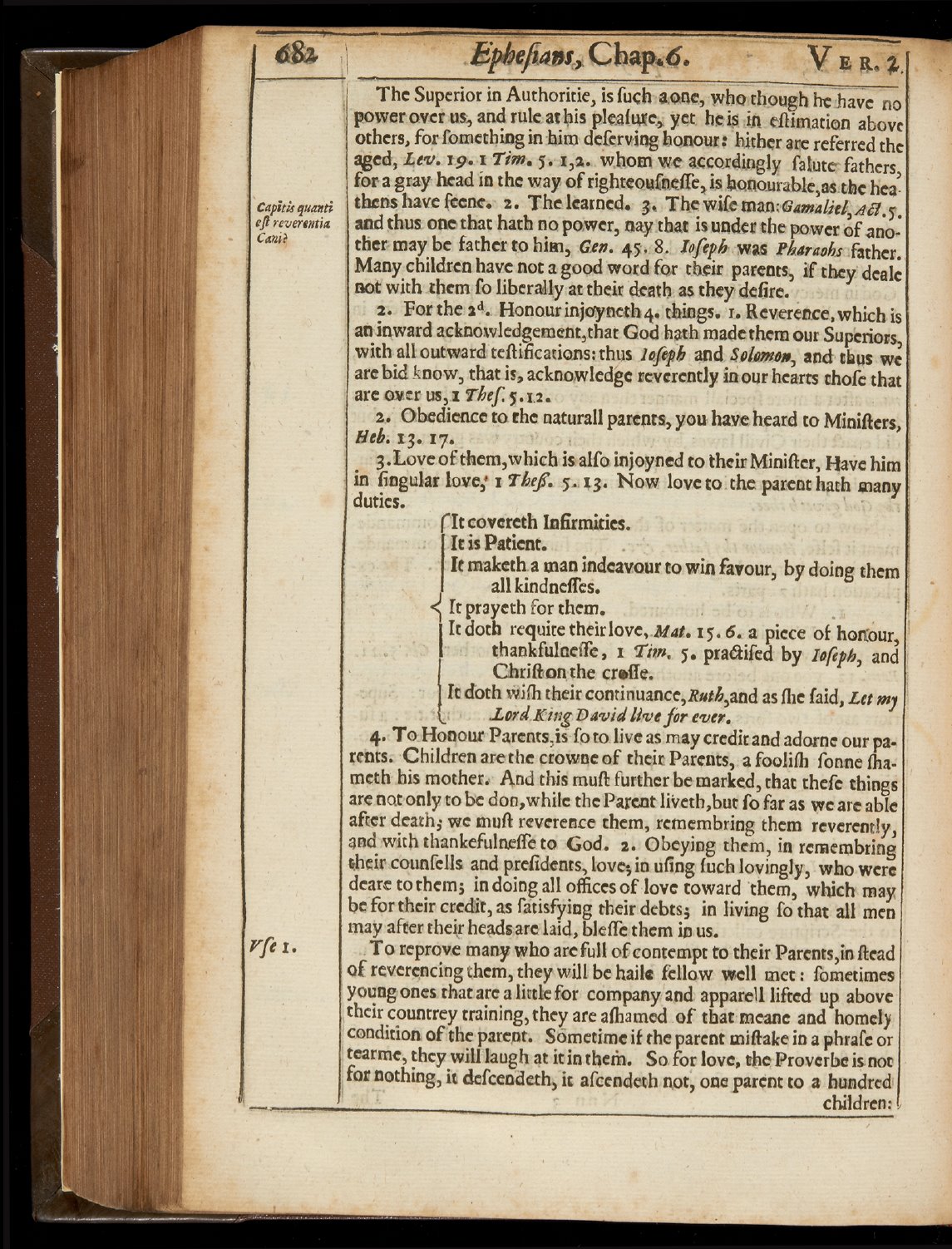

682.,
Ephefian,r,
Chapdó.
V
E
R.
.
Capiti
guanti
eft reverentia
Cani?
Yfe
I.
The
Superior
in
Authoritie,
is
fuch
aone, who though
he
have
no
power over
us, and rule at his pleafure,
yet
he
is
in
eflimarion
above
others, for fomething
in
him deferving
honour:
hither
are
referred the
aged,
Lev. 19.
I
Tim.
5.
1,2.
whom
we accordingly
falute fathers,
for
a
gray head
in
the way
of
righteoufneffe,
is
laonourable,as
the
hea-
thens have
fcene.
z.
The
learned.
3.
The
wife
man:Gamaliel,A8.5,
andthus one
that bath
no
power,
nay
that
is
under the power
of
ano-
ther
may be
father to him,
Gen.
45.
8. Iofeph was Pharaohs
father.
Many children have not
a
good word
for their parents,
if
they
Beale
not with them
fo
liberally at their death
as
they
deliire.
2.
For the
ad.
Honourinjoyneth 4. things.
r. Reverence, which
is
an
inward acknowledgement,that God bath madethem
our Superiors,
with
all
outward teflifìcations:thus
lofeph
and
Salomûi.,
and thus
we
are
bid know, that
is,
acknowledge reverently
in
our hearts thofe that
are over
US
Thef 5.12.
2.
Obedience to the naturali parents, you have heard to
Miniflers,
Heb.
13. 17.
3.Love
of
them,which
is
alfo injoyned
to their
Minifler, Have him
in
ungular
love;
a
Thef.
5.
13.
Now
love
to the
parent bath many
duties.
CIt
covereth
Infirmities.
It
is
Patient.
It maketh
a
man indeavour
to
win favour,
by doing
them
all
kindnefí'es.
It prayeth or
them.
I
Ic
doth
require their love, Mat.
15.6.
a piece of
honour,
thankfulnetïe,
1
Tim. 5. praékifed
by Iofph,
and
Chriftonthe
erotic.
It
doth
with their continuance,Ruth,and
as file
Paid,
Let
my
Lord King
Davidlive for
ever.
4.
To
Honour Parents.is
fo to live
as
may credit and adorne our
pa-
rents.
Children
are
the crowne
of
their Parents,
a
foolifh fonne
fha-
mcth
his
mother.
And
this muff
further be marked,
that
thefe things
are not only to be
don,while the Patent liveth,but fo
far as we
are
able
after
dearh;
we muff
reverence
them, remembring them
reverently,
and
with
thankefulneffe
to God.
2.
Obeying them,
in
remembring
their counfells
and prefrdents,
love;
in
ufing fuch
lovingly, who were
deare
to them;
in
doing
all offices
of
love
toward them, which
may
be
for their credit,
as
fatisfying their
debts;
in
living
fo
that
all men
may after their heads are
laid,
bleffe
them
in
us.
To
reprove many who
arefull
of
contempt to their Parents,in
Alead
of
reverencing diem, they will be haile fellow well met
:
fometimes
young ones
that
are
a
little for
company
and apparel! lifted up above
their countrey training, they
are
all-lamed
of
that
mean¢ and homely
condition
of
the parent. Sometime
if
the parent
miftake
in a
phrafe or
tearme, they
will laugh
at
it
in
them. So for
love, the Proverbe
is
not
for nothing,
it
defcendeth,
it afcendeth
not,
one
parent to
a
hundred
children:

















